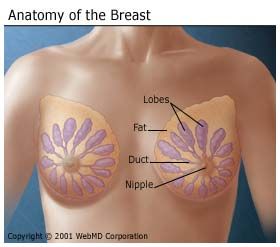
Ask Glen!
Q. What is Breast Cancer?
A.Each month, a woman's breasts go through temporary changes associated with menstruation, and a lump may form. While the vast majaority of these growths are not cancerous, any lump should be examined immediately.
Lumps are most common in the lobules -- small sacs that produce milk -- or the ducts that carry milk to the nipple. But they occasionally start in other tissue. The two main categories of breast cancer are lobular and ductal carcinomas.

Breast cancer usually begins with the formation of a small, confined tumor. Some tumors are benign, meaning they do not invade other tissue; others are malignant, or cancerous. Malignant tumors have the potential to metastasize, or spread. Once such a tumor grows to a certain size, it is more likely to shed cells that spread to other parts of the body through the bloodstream and lymphatic system. Different types of breast cancer grow and spread at different rates; some take years to spread beyond the breast, while others move quickly.
Men can get breast cancer, too, but they account for less than one-half of one percent of all cases. Among women, breast cancer is the most common cancer and the second leading cause of cancer deaths -- behind lung cancer.
If eight women were to live to be at least 85, one of them would be expected to develop the disease at some point during her life. Two-thirds of women with breast cancer are over 50, and most of the rest are between 39 and 49.
Fortunately, breast cancer is very treatable if detected early. Localized tumors can usually be treated successfully before the cancer spreads; and in nine in 10 cases, the woman will live at least another five years. Experts usually consider a five-year survival to be a cure.
Once the cancer begins to spread, getting rid of it completely is more difficult, although treatment can often control the disease for years. Improved screening procedures and treatment options mean that at least seven out of 10 women with breast cancer will survive more than five years after initial diagnosis, and half will survive more than 10 years.What Causes Breast Cancer?
Although the precise causes of breast cancer are unclear, we know what the main risk factors are. Still, most women considered at high risk for breast cancer do not get it, while many who do have no known risk factors. Among the most significant factors are advancing age and a family history of breast cancer. Risk increases slightly for a woman who has had a benign breast lump and increases significantly for a woman who has previously had cancer of the breast or the ovaries.
A woman whose mother, sister, or daughter has had breast cancer is two to three times more likely to develop the disease, particularly if more than one first-degree relative has been affected. Researchers have now identified two genes responsible for some instances of familial breast cancer -- called BRCA1 and BRCA2. About one woman in 200 carries it. Having the gene predisposes a woman to breast cancer but does not ensure that she will get it.
Generally, women over 50 are more likely to get breast cancer than younger women, and African-American women are more likely than Caucasions to get breast cancer before menopause.
A link between breast cancer and hormones is gradually becoming clearer. Researchers think that the greater a woman's exposure to the hormone estrogen, the more susceptible she is to breast cancer. Estrogen tells cells to divide; the more the cells divide, the more likely they are to be abnormal in some way, possibly becoming cancerous.
A woman's exposure to estrogen and progesterone rises and falls during her lifetime, influenced by the age she starts and stops menstruating, the average length of her menstrual cycle, and her age at first childbirth. A woman's risk for breast cancer is increased if she starts menstruating before age 12, has her first child after 30, stops menstruating after 55, or has a menstrual cycle shorter or longer than the average 26-29 days. Current information indicates that the hormones in birth control pills probably do not increase the risk. Some studies suggest that taking hormone replacement therapy after menopause may increase risk, especially when taken for more than 5 years. The jury is still somewhat out on this matter though. Heavy doses of radiation therapy may also be a factor, but low-dose mammograms pose almost no risk.
The link between diet and breast cancer is debated. Obesity is a noteworthy risk factor, and drinking alcohol regularly -- more than a couple of drinks a day -- may promote the disease. Many studies have shown that women whose diets are high in fat are more likely to get the disease. Researchers suspect that if a woman lowers her daily calories from fat -- to less than 20%-30% -- her diet may help protect her from developing breast cancer.
Any personal health questions,Please consult your physician !
Glen Edward Mitchell
Got a question? Ask Glen!




No comments:
Post a Comment